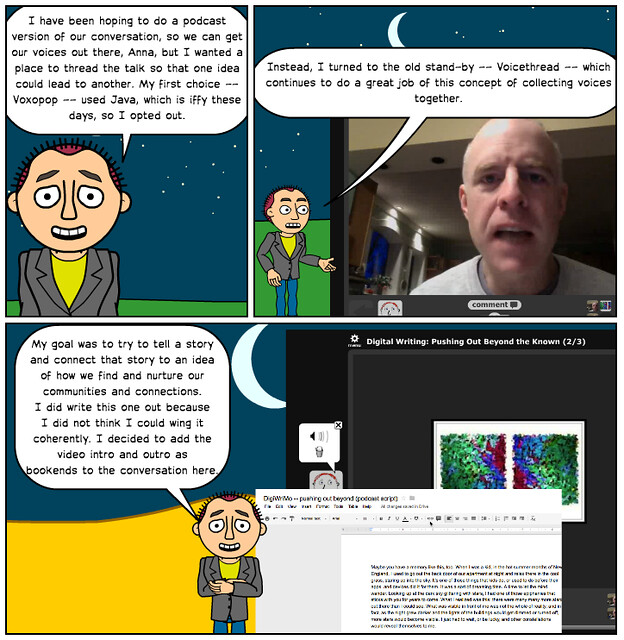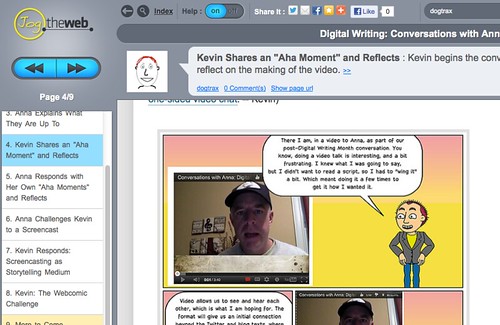
I jumped on board with the Digital Writing Month because the idea of National Novel Writing Month intimidated me and yet, I wanted a challenge that might push me in few different directions as a writer. A challenge that matched writing with technology, and deeper reflective stances, was right up my alley. I knew right from the start that I would not be counting words, since the 50,000 words of Digital Writing made no sense, particularly if I was going to be making comics, and videos, and other media compositions in which words were relatively meaningless. I still find it odd that folks are sharing their counts as they reflect on the work they did during the month. But I suppose we are a culture that is goal-orientated, and words are something one can tally up.
For me, it was more about the exploration of ideas, and the “creating” of media that became the heart of my inquiry with Digital Writing Month. I was hoping to get inspired by the community, and maybe offer up some inspiration myself. To that end, I think the month was a success. I dove into a lot of waters (swimming with the duck) and forced myself to continue to expand the notion of what writing and composition is when we engage with digital tools.
I keep returning to this question: is our definition and conception of writing shifting in the age of technology? I still don’t know. But I keep that question in mind as I experiment, tinker, write and then bring those ideas into my sixth grade classroom, where appropriate for the learning objectives that I have in mind. But I often feel like two people: the teacher, exploring to understand and use technology with my students, and the writer, exploring to communicate and develop ideas in new digital spaces. Sometimes, those identities overlap (I’m thinking of webcomics and game design). Sometimes, they don’t. I’ve come to understand that those dichotomies are fine.
So, what did I dive into this month:
- Many webcomics. I began the month by thinking it would be neat to have an evolving webcomic featuring a teacher and two students who were also taking part in Digital Writing Month. They could be my foils, and the comic — featuring Mr. Andrew, and Shirley and Dave — gave me a chance to poke fun at what I was doing. I used that idea for a few meta-comics, too, so that I could reframe the idea of webcomics in an interesting way. Not sure if it always worked, but it was an attempt to stretch out the writing.
- I sought to use audio and podcasting in slightly different ways. In one instance, I layered audio on top of one of the comics to give “voice” to my characters. Later, I wrote a poem about multiple voices of a writer, and then used audacity to record myself in various frequencies, weaving those voices (of the same me) into a poem.
- I created and published a video game about Digital Writing Month, using the hashtag of #digiwrimo as my entry to adventure, with the player having to scale through and in the letters as they sought rewards. The game — Inside Digital Writing — is still available for play, if you want to give it a try.
- I took part in the collaborative Novel in a Day event that the folks behind Digital Writing Month hosted, adding a few vignettes to a 50,000 word story that emerged over a 24 hour period. It was a fascinating experience to be part of something that huge, and to feel as if you were helping to weave an odd narrative together with strangers. Odd, but interesting.
- Another odd experience was the Twitter vs. Zombies virtual game that unfolded on Twitter over one long weekend. Another collaborative idea from the Digital Writing Project folks, and completely new terrain for me, the game involved a “battle” between friends on Twitter who were either zombies trying to convert humans, or humans running from zombies. It’s hard to explain the appeal, but there was a real playfulness to the event, and the ending – the brokering of peace and the splintering of alliances – was really intriguing to watch unfold in Twitter real time.
- I reformatted some old projects as a way to refresh them (I hope), including this video poem — Capturing Myself in Hyperlink – that used to be housed on a large webpage, with anchors and hyperlinks connecting ideas together. But I decided to explore a bit more about the annotation feature in YouTube to create the links to elements of the poem right inside the video itself. I’m not completely happy with it, but it sure was interesting to reconceptualize the project.
- And I used Thinglink to try to break apart and define some of my ideas about digital writing (as well as took part in the final Twitter Essay about our ideas on digital writing — which is the screenshot embedded above). I like this multmedia defining of digital writing, though, because it allowed me to use media to explain the ideas.

Another thing that comes to mind is the concept of community. Every so often, I bump into a group of people who are doing interesting things online, and I wonder: how come I am just learning about them now? It can often feel surreptitious, this chance knocking into other folks on similar journeys but outside the normal sphere of community. That’s how I felt this month with the Digital Writing Month crowd. There were few folks that I knew prior to the challenge. Mostly, I think, it is because the majority of participants are graduate students in New Literacies programs. I suspect a lot of them already know each other, or know of each other. (I may be wrong about that, though).
I didn’t get the real sense that other elementary school teachers were taking part in the challenge. Or any other school teachers of any K-12 levels, to be honest. So, this made my experience different from the writing and connective work I do with organizations like the National Writing Project, where we have an affinity that binds us together. Here, in Digital Writing Month, I was surrounded by some incredible smart and talented and insightful people, but our visions diverged at times from our different experiences, I think. I find myself (as noted above) thinking in terms of exploration as classroom possibilities — how to bring my young students into the digital age as writers of media. They were mostly thinking of rhetorical stance, and deeper underlying issues of digital writing. Both perceptions are valid, of course, and yet, I often felt like an outsider crashing a party of grad students and University folks.
This was most evident in the ways that folks taking in the Digital Writing Month challenge commented on other’s work. Mostly, they didn’t, at least as far as I could tell. Oh sure, there were reactions to work on Twitter, but the deeper, richer conversations that I thought would emerge along the lines of the shifting nature of digital writing rarely took place on the blogs and posts and places that I went to. I tried my best to leave comments to what other folks were writing, to stoke a topic, but only rarely did that thread go anywhere, and they never really seemed to evolve into a full and ranging discussion.
I’m not saying that’s bad. But it is interesting, particularly as so many of the folks were writing about the changing nature of community in digital spaces in their own posts and Tweets. It seemed like a case of a theoretical view of the potential of digital writing spaces clashing against the reality of much of our writing still falling into the familiar pattern of “I write, you read.” Instead, I’d like to see more of the “I write, you react, we write together.”
But it was a blast, this whole Digital Writing Month adventure. If you took part, or just followed along, thanks for staying with me and indulging my strange forays into different tools and topics. I invite you to add your own thoughts to my post, and start a conversation. I promise to engage you in an exploration, too.
Peace (in the writing),
Kevin











